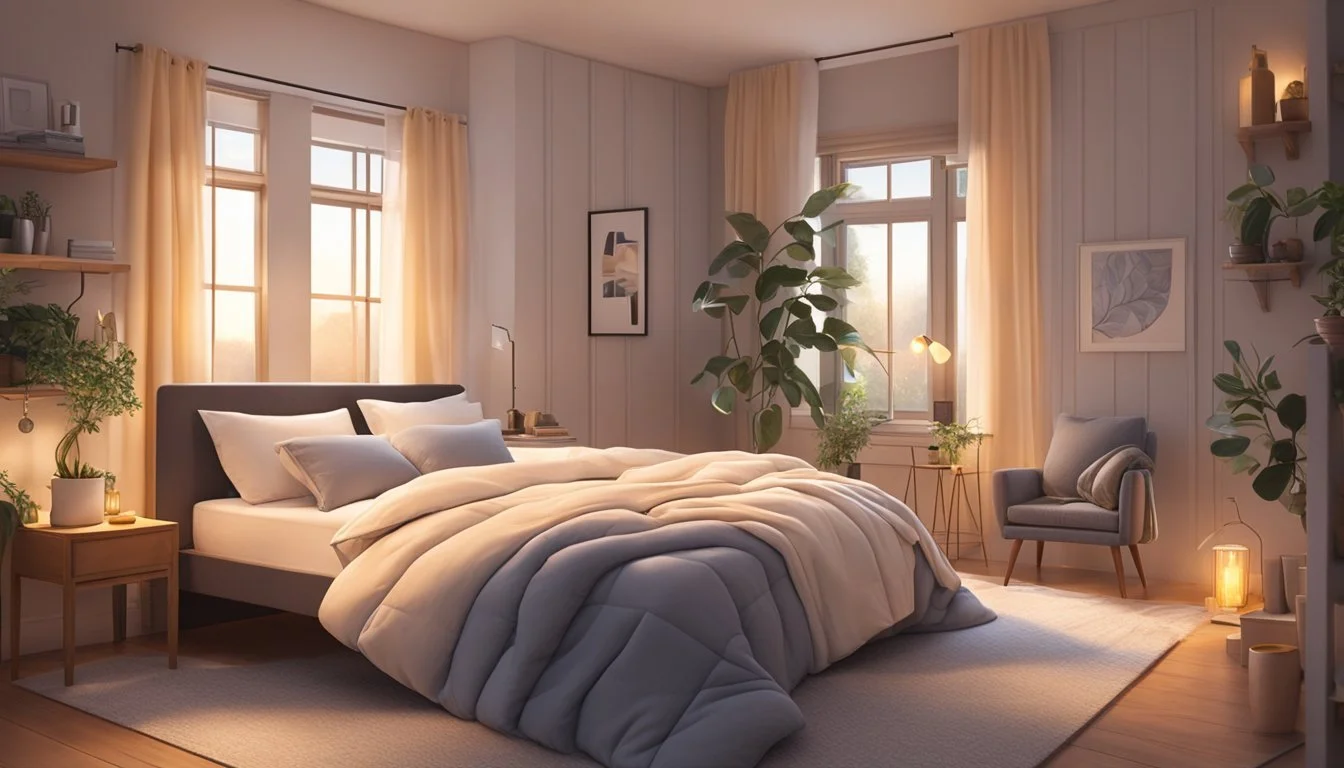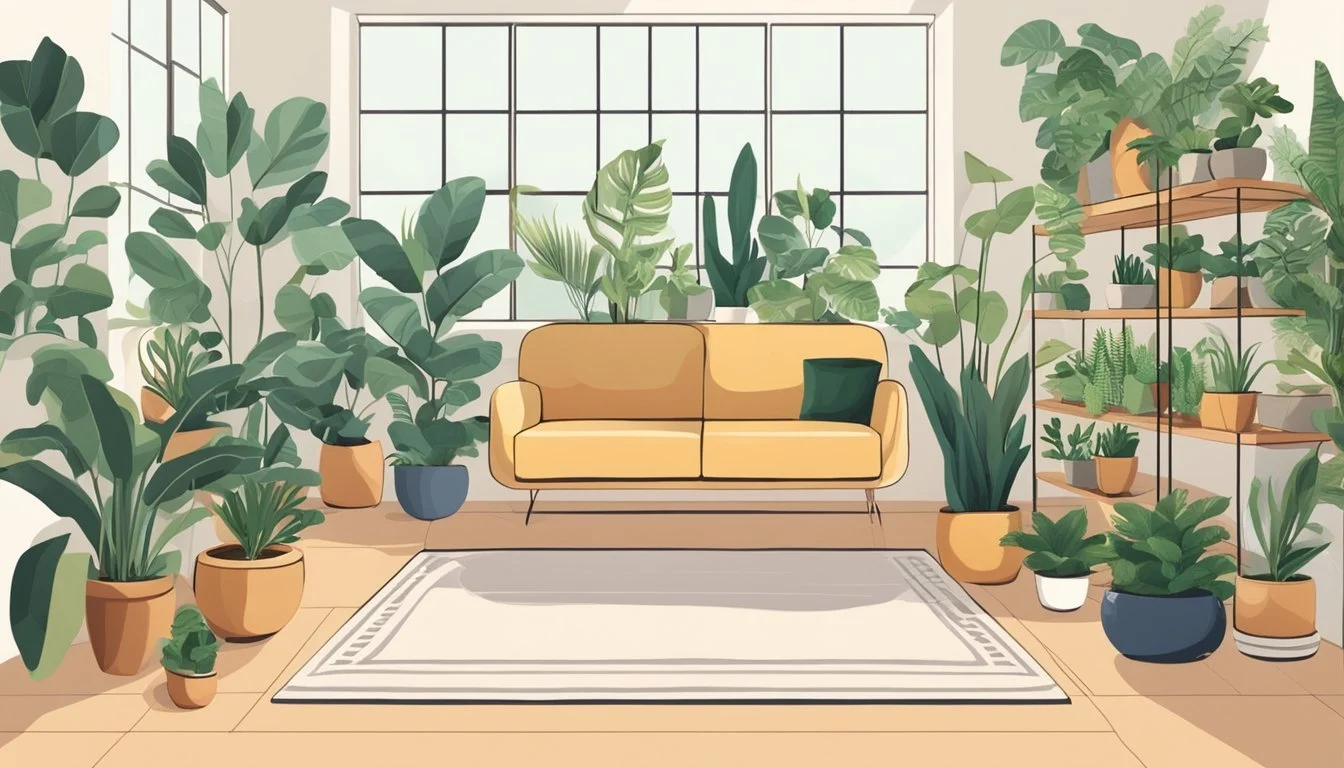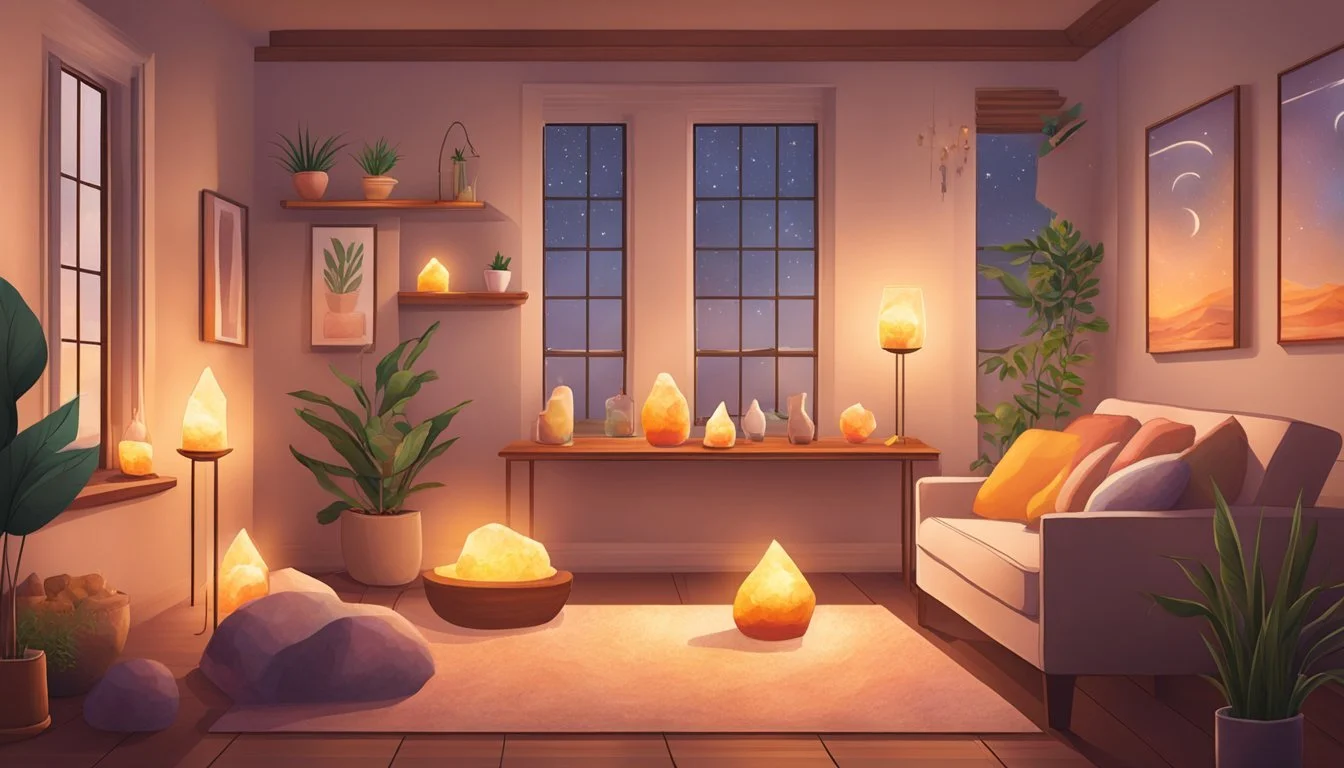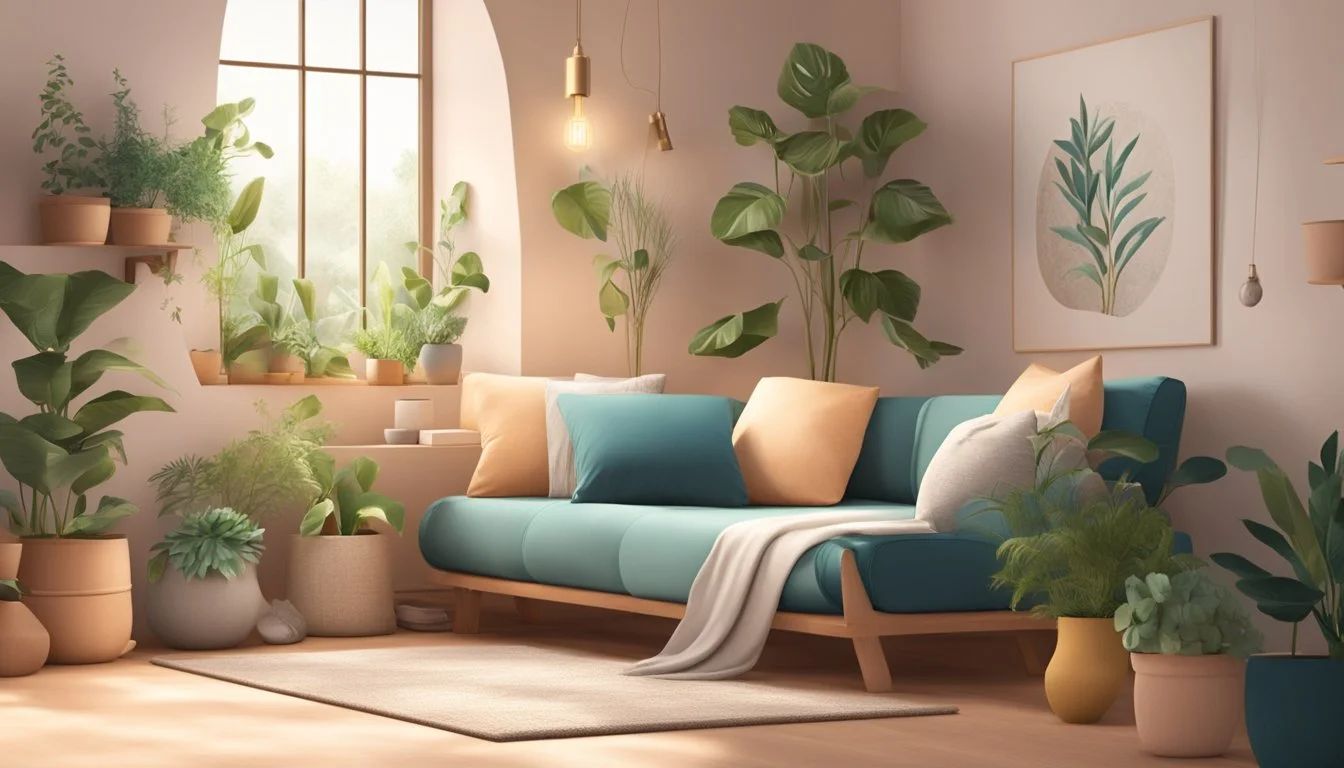11 Ways Empaths Can Create Personal Sanctuary Spaces
Designing Tranquil Retreats for Emotional Well-being
Empaths often experience emotional overwhelm due to their heightened sensitivity to the feelings and energies of others. Creating personal sanctuary spaces can provide essential relief and restoration for these individuals. These dedicated areas serve as havens where empaths can recharge, process emotions, and find respite from external stimuli.
By designing and maintaining personal sanctuaries, empaths can better manage their emotional well-being and cultivate a sense of inner peace. These spaces can take various forms, from a cozy corner in a bedroom to a secluded outdoor nook, tailored to the individual's preferences and needs. Implementing specific techniques and practices within these sanctuaries can further enhance their effectiveness in supporting empaths' emotional balance and overall quality of life.
1) Soundproofing panels
Soundproofing panels are an effective solution for empaths seeking to create a peaceful sanctuary. These panels absorb sound waves, reducing noise levels and creating a calmer environment.
Acoustic panels come in various materials, including foam, fiberglass, and fabric-wrapped options. They can be mounted on walls or ceilings to minimize sound reflections and echoes within a room.
For optimal results, empaths should consider placing panels strategically in their space. Key areas include walls adjacent to noisy neighbors, corners where sound tends to accumulate, and surfaces opposite windows.
Decorative soundproofing panels offer both functionality and aesthetic appeal. They come in different colors and patterns, allowing empaths to maintain their personal style while enhancing sound absorption.
Installing soundproofing panels can significantly reduce external noises, creating a quieter and more serene atmosphere. This reduction in auditory stimulation helps empaths recharge and process emotions without additional sensory input.
2) Noise-cancelling headphones
Noise-cancelling headphones offer empaths a portable sanctuary from overwhelming auditory stimuli. These devices use advanced technology to reduce ambient sounds, creating a peaceful audio environment.
For highly sensitive individuals, noise-cancelling headphones can provide relief in busy or loud settings. They're particularly useful in public spaces, offices, or during travel, where controlling external noise is challenging.
Many empaths find these headphones help them focus, relax, or meditate. By blocking out distractions, they allow for deeper concentration and a sense of calm.
Some models offer adjustable noise-cancellation levels, letting users customize their experience. This feature enables empaths to find the right balance between isolation and awareness of their surroundings.
Comfort is crucial for extended wear. Many noise-cancelling headphones now come with plush ear cushions and lightweight designs, ensuring they can be used for long periods without discomfort.
While primarily used for music or podcasts, these headphones can also provide silence. This versatility makes them a valuable tool for empaths seeking moments of quiet throughout their day.
3) Essential oil diffusers
Essential oil diffusers offer empaths a powerful tool for creating a soothing atmosphere in their personal sanctuary spaces. These devices disperse aromatic oils into the air, filling rooms with calming scents that can help reduce stress and promote relaxation.
Lavender, chamomile, and bergamot oils are popular choices for their calming properties. Diffusing these scents can create a tranquil environment, helping empaths unwind after a long day of absorbing others' emotions.
Many diffusers also feature soft lighting options, adding to the peaceful ambiance. Some models allow users to set timers, ensuring the diffuser runs for an optimal duration without requiring constant attention.
For empaths who are sensitive to strong smells, diffusers with adjustable mist settings provide control over the intensity of the aroma. This customization allows individuals to find the perfect balance for their personal comfort.
Incorporating an essential oil diffuser into nightly routines can signal the transition to relaxation time. The gentle hum and soothing scents create a multi-sensory experience that helps empaths shift their focus inward and prepare for rest.
4) Weighted blankets
Weighted blankets can be valuable tools for empaths seeking comfort and relaxation in their personal sanctuary spaces. These blankets provide gentle, distributed pressure across the body, which can help reduce anxiety and promote a sense of security.
Many empaths find that the deep pressure stimulation from weighted blankets helps calm their nervous system. This can be especially beneficial after a day of absorbing others' emotions or when feeling overwhelmed by external stimuli.
When selecting a weighted blanket, empaths should choose one that is approximately 10% of their body weight. This ensures optimal pressure without feeling restrictive. Some blankets offer removable covers for easy washing and temperature regulation.
Empaths may find weighted blankets particularly useful during meditation, reading, or sleep. The added weight can help ground their energy and create a cocoon-like effect, shielding them from external influences.
For those who tend to feel overheated, cooling weighted blankets are available. These use breathable fabrics or special cooling technologies to maintain a comfortable temperature while still providing the benefits of deep pressure.
5) Indoor plants
Indoor plants can transform an empath's living space into a soothing sanctuary. These natural elements help purify the air and create a calming atmosphere. Empaths often find that greenery absorbs negative energy and promotes a sense of peace.
Selecting low-maintenance plants like snake plants, pothos, or peace lilies can reduce stress for empaths who may feel overwhelmed by complex care routines. Placing plants strategically throughout the home creates pockets of tranquility and natural beauty.
Herb gardens in the kitchen or living areas offer both visual appeal and aromatic benefits. The scents of rosemary, basil, or mint can provide a sensory retreat for empaths seeking comfort in their surroundings.
Larger plants like fiddle leaf figs or monstera deliciosa make striking focal points and can serve as natural room dividers. This helps empaths create defined spaces within open floor plans, offering a sense of structure and privacy.
Caring for plants can also be a meditative practice for empaths, allowing them to connect with nature and nurture living things. This gentle activity can serve as a grounding ritual, helping empaths recharge and find balance in their home environment.
6) Salt lamps
Salt lamps can be a valuable addition to an empath's personal sanctuary space. These lamps are made from large chunks of Himalayan pink salt and contain a small light bulb inside.
When illuminated, salt lamps emit a warm, soothing glow that can help create a calming atmosphere. Many empaths find the soft orange-pink light relaxing and grounding.
Salt lamps are believed to release negative ions into the air when heated. Some empaths report feeling that these ions help cleanse the energy in a room, though scientific evidence for this effect is limited.
Placing salt lamps in key areas of the home, such as bedrooms or meditation spaces, may enhance the sense of tranquility. The natural, organic shape of the salt crystals can also add an appealing visual element to the decor.
For empaths seeking to create a peaceful environment, salt lamps can serve as both functional lighting and decorative accents. Their gentle illumination may be particularly appreciated during evening relaxation or unwinding routines.
7) Aromatherapy candles
Aromatherapy candles offer empaths a powerful tool for creating a soothing sanctuary space. These specially crafted candles release essential oil scents that can influence mood and promote relaxation.
Lavender candles are particularly beneficial for empaths, as they help reduce stress and anxiety. The calming aroma can create a tranquil atmosphere, perfect for unwinding after a long day.
Vanilla scented candles provide a warm, comforting ambiance that many empaths find grounding. This sweet fragrance can help create a sense of safety and security within the home.
For empaths seeking mental clarity, peppermint or eucalyptus candles can be invigorating. These scents may help improve focus and alleviate mental fatigue.
When selecting aromatherapy candles, opt for those made with natural ingredients like soy or beeswax. These tend to burn cleaner and release fewer toxins than paraffin candles.
Strategically place candles in areas where empaths spend the most time, such as bedrooms or meditation spaces. Always follow proper safety guidelines when using candles, including never leaving them unattended.
8) Water fountains
Water fountains can be a soothing addition to an empath's sanctuary space. The gentle sound of flowing water creates a calming atmosphere that helps mask external noises and promotes relaxation.
Empaths may find tabletop fountains particularly beneficial for indoor spaces. These compact options can be placed on desks, nightstands, or shelves, providing a focal point for mindfulness and stress relief.
For outdoor sanctuaries, larger garden fountains offer a serene backdrop. The sight and sound of cascading water can help empaths ground themselves and release absorbed emotions.
Choosing a fountain with natural materials like stone or bamboo can enhance the connection to nature. This connection is often restorative for empaths who are sensitive to their environment.
When selecting a water fountain, empaths should consider the sound level. Some may prefer a gentle trickle, while others might enjoy a more robust flow. The key is finding a balance that feels soothing without overwhelming the senses.
Regular maintenance of the fountain ensures it remains a positive element in the sanctuary. Clean water and proper upkeep contribute to a harmonious energy in the space.
9) Meditation cushions
Meditation cushions play a crucial role in creating a comfortable sanctuary space for empaths. These specialized cushions provide proper support for extended sitting periods during meditation or relaxation.
Empaths can choose from various types of meditation cushions, including zafu, zabuton, and crescent-shaped options. Each design offers unique benefits for different sitting positions and personal preferences.
When selecting a meditation cushion, empaths should consider factors such as firmness, height, and material. Natural fabrics like cotton or linen are often preferred for their breathability and eco-friendly qualities.
The right cushion can help maintain proper posture, aligning the spine and reducing discomfort during meditation sessions. This physical comfort allows empaths to focus more deeply on their practice and achieve greater mental clarity.
Placing meditation cushions in a designated area of the home creates a visual cue for relaxation. This dedicated space can serve as a retreat for empaths to recharge and process emotions throughout the day.
Empaths may also benefit from having multiple cushions available for guests or group meditation sessions. This thoughtful addition can foster a sense of community and shared mindfulness practice within their sanctuary space.
10) Fairy lights
Fairy lights are a simple yet effective way for empaths to create a soothing atmosphere in their personal sanctuary. These delicate strands of light can transform a space, adding a soft, warm glow that promotes relaxation and tranquility.
Empaths can use fairy lights to define specific areas within their sanctuary. Draping them around a reading nook or meditation corner helps establish a cozy, inviting ambiance.
The gentle illumination from fairy lights can be particularly beneficial for empaths who are sensitive to harsh lighting. Unlike bright overhead lights, fairy lights provide a subtle radiance that's easier on the eyes and nervous system.
Empaths may find that the twinkling effect of some fairy light designs mimics the calming qualities of candlelight without the fire hazard. This can create a serene environment for unwinding after a long day of absorbing others' energies.
Choosing warm-toned fairy lights can enhance the comfort factor of a space. Soft yellow or amber hues are often more soothing than cool blue or white tones for many empaths.
11) Incense sticks
Incense sticks offer empaths a powerful tool for creating a personal sanctuary. The aromatic smoke can help cleanse and purify the energy of a space, providing a sense of calm and tranquility.
Different types of incense cater to various needs. Frankincense promotes clarity and spiritual growth, while Palo Santo is known for enhancing peace and positive energy.
Burning incense can be a simple yet effective ritual for empaths to reset their energy. The act of lighting a stick and watching the smoke rise can be meditative, helping to ground and center oneself.
Empaths may find that certain scents resonate more strongly with them. Experimenting with different fragrances can lead to discovering the most beneficial ones for personal use.
When using incense, it's important to ensure proper ventilation. This prevents the smoke from becoming overwhelming and maintains a comfortable atmosphere in the sanctuary space.
Incorporating incense into daily routines, such as meditation or relaxation practices, can enhance the overall experience and deepen the sense of sanctuary for empaths.
Understanding the Needs of Empaths
Empaths have unique sensitivities and requirements that stem from their heightened ability to absorb and process emotions. Their well-being depends on creating environments that support their emotional equilibrium and provide adequate personal space.
Emotional Sensitivity
Empaths possess an extraordinary capacity to sense and internalize the emotions of others. This trait allows them to form deep connections but can also lead to emotional overwhelm. They often experience intense reactions to external stimuli, including other people's moods and energies.
Empaths may struggle in crowded or emotionally charged environments. They need regular periods of solitude to recharge and process their experiences. Many empaths find solace in nature, using it as a grounding force to balance their emotional state.
To thrive, empaths require:
Quiet time for reflection
Opportunities to engage with nature
Supportive relationships with clear boundaries
Techniques for emotional self-regulation
Importance of Personal Space
Personal space is crucial for empaths to maintain their emotional and mental well-being. A dedicated area for retreat allows them to decompress and shield themselves from external energies.
This space should be tailored to the empath's preferences, often incorporating:
Soft lighting
Comfortable seating
Natural elements like plants or crystals
Minimal clutter
Empaths benefit from establishing clear boundaries in their personal and professional lives. They need to communicate their space requirements to others and practice saying no to preserve their energy.
Creating a sanctuary at home or work provides empaths with:
A buffer against emotional overload
A place for emotional reset
Enhanced focus and creativity
Improved overall well-being
Designing a Sanctuary Space
Creating a personal sanctuary requires thoughtful planning and design choices. The right location, color palette, and natural elements can transform a space into a soothing retreat for empaths.
Selecting the Right Location
Choose a quiet, secluded area of your home for your sanctuary. A spare bedroom, corner of the living room, or even a closet can work well. Ensure the space is away from high-traffic areas and noise sources. Consider natural light availability - a room with windows can provide a connection to nature.
If possible, select a location with a door for privacy. This physical boundary helps create a mental separation from the outside world. For open areas, use room dividers or curtains to define the space.
Size isn't crucial - even a small nook can serve as an effective sanctuary if designed thoughtfully.
Choosing Calming Colors
Select a color palette that promotes relaxation and peace. Soft, muted tones are often best for empaths. Consider these options:
Pale blues: Associated with calm and serenity
Gentle greens: Connected to nature and balance
Warm neutrals: Create a cozy, grounding atmosphere
Soft lavenders: Known for their soothing properties
Avoid bright or intense colors that may overstimulate. Use the chosen colors on walls, furnishings, and decor items. Create visual interest with slight variations in shade rather than stark contrasts.
Incorporating Natural Elements
Bring the outdoors in to enhance the calming effect of your sanctuary. Natural elements help ground empaths and provide a sense of connection to the earth. Try these ideas:
Plants: Add potted plants or a small indoor garden
Natural materials: Use wood, stone, or bamboo in furniture and decor
Water features: Include a small fountain or tabletop waterfall
Natural light: Maximize sunlight with sheer curtains or skylights
Organic textures: Incorporate woven baskets, wool throws, or linen pillows
Display crystals or rocks that resonate with you. Hang nature-inspired artwork or photographs. These elements create a multi-sensory experience that supports relaxation and emotional well-being.
Maintaining Your Sanctuary
Creating a personal sanctuary is just the first step. Regular upkeep and periodic refreshment are essential to preserve its calming effect and ensure it continues to serve as a restorative space for empaths.
Regular Cleaning
Maintain a clean and organized sanctuary to promote a sense of peace and clarity. Establish a routine for tidying up, dusting, and vacuuming. Remove clutter regularly, as it can accumulate negative energy and disrupt the tranquil atmosphere.
Consider using natural cleaning products with soothing scents like lavender or eucalyptus. These can enhance the calming ambiance while keeping the space fresh and hygienic.
Incorporate a quick daily tidy-up into your routine. This practice helps maintain order and prevents the need for time-consuming deep cleans later.
Updating Your Space
Periodically assess your sanctuary to ensure it still meets your needs. As you grow and change, your space should evolve with you. Rotate decorative elements or rearrange furniture to create a sense of renewal.
Introduce new items that resonate with your current emotional state or goals. This might include fresh plants, inspiring artwork, or meaningful objects that bring you joy.
Consider seasonal adjustments to your sanctuary. Add cozy blankets in winter or light curtains in summer to maintain comfort year-round.
Regularly evaluate the functionality of your space. Replace worn items, upgrade lighting, or add storage solutions as needed to keep your sanctuary practical and inviting.













